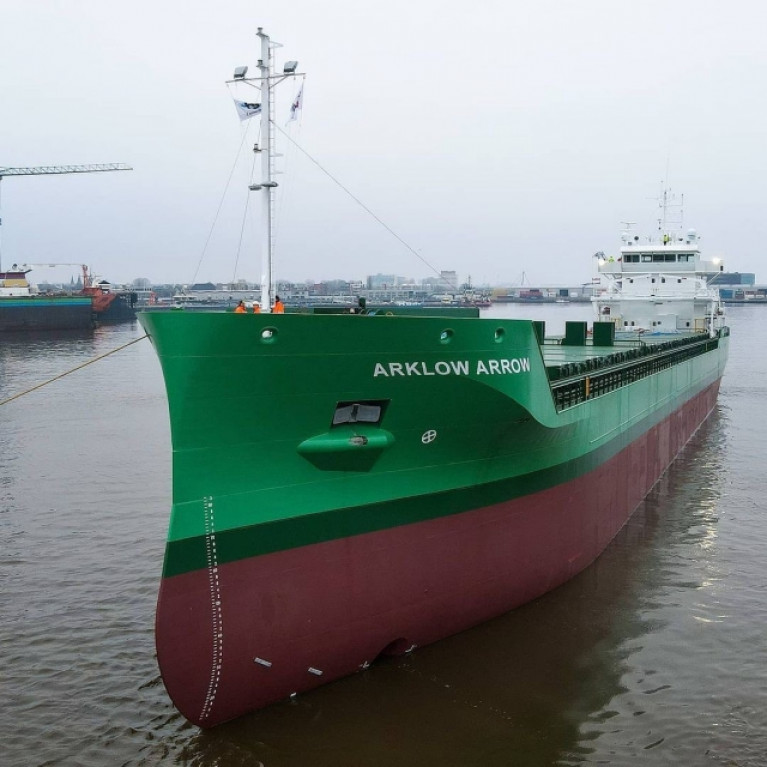Displaying items by tag: Cruiseship Marco Polo
Arklow Newbuild On Sea Trials While Another Fleetmate Dry Docks After Short Hop from Avonmouth
Arklow Shipping, operators of a fleet of dry-cargo short-sea traders and deep-sea ocean going bulkers, is where Afloat catches up with a sample of their ships in waters much closer to home, writes Jehan Ashmore.
Before this one cannot ignore their latest ship, Arklow Arrow albeit yet to enter service, yesterday undertook shipbuilders trials in the inshore waters of the Wadden Sea near the Dutch-German border.
Arklow Arrow of 8,543dwt, forms the fifth in a series of six 'A' class bulk oriented cargoships so far built by Ferus Smit's Dutch shipyard that was launched late last year. It was from the yard's inland location in Westerbroek where the 120m newbuild, the first to take this name, was towed along the canal system to Delfzijl.
After an initial period spent at the port, Arklow Arrow made a short passage to Eemhaven from where the newbuild carried out the trials in waters that lead further out into the North Sea.
The newbuild 'A' class belongs to the shipyard's 8,400dwt (circa) design series where cargo is contained in 2 box-shaped holds within a double hull and use of pontoon hatch covers.
A crew of 9 are accommodated in airconditioned cabins and equipped with private sanitairy units. Arrow's design is based from a slightly modified version of the B' class 8,600dwt bulkers also completed by Ferus Smit.
Dublin Port
Among this B class is Arklow Bay, which arrived in Dublin Port yesterday and remains berthed at Deepwater Quay otherwise known as the 'Coal' Quay.
The ship arrived from Gijon, northern Spain on a link that down the decades has seen the cargo of scrap metal carried out.
Prior to arrival, the ship unusually took anchorage up offshore off Killiney Bay.
Swansea (Dry Docks)
Afloat also tracked Arklow Rainbow today, having been in Swansea Dry Docks for some time. SDD have benefitted from ASL's custom since the closure of Dublin Dry Docks in recent years.
The R class short sea traders are among the oldest tonnage of 7 remaining R ships and that of the overall fleet. The class dating from 2002 had been an original 16-strong series that provided the backbone of work in European waters before new tonnage led to disposal.
The fleet in general transport cargoes among them bulk grain trades, dangerous bulk cargoes, steel rails, minerals and project cargoes.
Avonmouth, Bristol Channel
It was during a previous Afloat tracking in November that another B-class (previous version) Arklow Brook had too previously occupied SDD and likewise of the R class made the short passage from Avonmouth.
Also then the F class Arklow Flair had berthed in Avonmouth Docks (the Port of Bristol along with Portbury), as this is where Arklow Rainbow is now next expected to call.
Arklow's to Marco Polo (Cruiseship)
Also tracked on that same occasion, it was noted the laid-up classic cruiseship, Marco Polo the veteran dating from the 1965 was built as a liner during the Soviet era eventually becoming the first ship for UK non-fly operator, Cruise & Maritime Voyages. CMV however collapsed last year due to Covid's dramatic impact on the global cruise industry.
Afloat had tracked the 880 passenger Marco Polo in Avonmouth Docks on the day before a departure on 19 November, (following an auction sale) and again while in the Meditteranean Sea. This was to facilitate a delivery voyage for new owners with a next port of call bound for Dubai.
Circumstances have since changed last month given the career in the Middle East (albeit planned as a hotel ship) have turned dramatically as the ship instead proceeded further east to India but for scrapping at Alang.
This final episode marks the demise of the classic cruiseship, having provided direct cruises out of Belfast Harbour and also calls to Irish ports regularly since 2010, the year CMV founded.
Another development Afloat will also follow up in greater detail has come to attention this week involving the 'adults' only CMV cruiseship Magellan as Ships Monthly also reported.
The1985 built ship Afloat adds also served in domestic waters with Irish cruisegoers directly departing Irish ports is too heading for the shipbreakers.
Magellan along with Marco Polo were the only CMV cruiseships of their fleet that served the Irish marketplace directly. The operator though also had an extensive cruise programme in Europe and operations beyond among them Marco Polo which had made cruises in Canadian waters.




























































